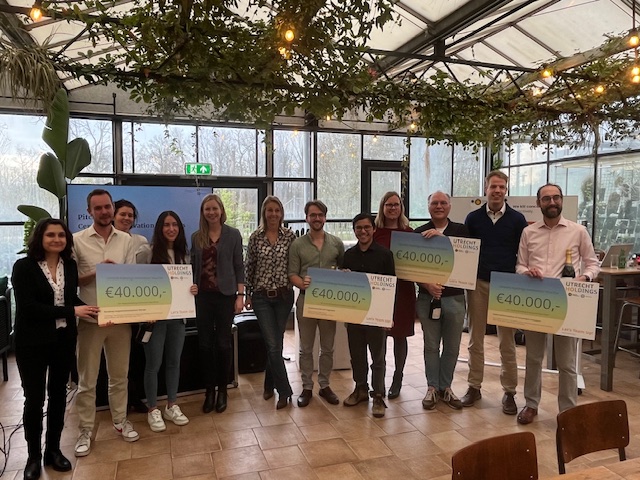
To support the most promising research, advance it and generate impact, we annually award innovation vouchers worth 40,000 euros.
This year, 4 research groups were selected. They received the check during the Utrecht Holdings network event in the Botanical Garden on Thursday, March 28, from Tessa Scharringhausen, Director KTO, and the Business Developers involved in the research group.
Below more info about the researchprojects:
Nanobody-targeted photodynamic therapy
by Sabrina Oliveira, Irati Beltrán Hernández and Sebas Pronk
(Cell Biology, Neurobiology and Biophysics, Department of Biology, Utrecht University)
Invention
Head and neck cancer is the sixth most common type in Europe, with limited treatment options. The team has developed a new therapy that consists of a one-day treatment with no side-effects. With nanobody-targeted photodynamic therapy, cancer cells are killed upon local light application.
Voucher project/ goal
For further development towards market, a start-up will be established in the near future. With the innovation voucher, the academic team aims on de-risking their project for regulatory issues and production issues. Furthermore, they want to generate in vivo data that can be added to the patent to prove advantages of their proprietary linking technology compared to conventional linking technology.
Fungi waste treats water waste: contribution to a healthy society
by Han Wösten and Brigit van Brenk
(Molecular Microbiology, Department of Biology, Utrecht University)
Invention
The increasing concentration of pollutants in our waters leads to contaminated sources for drinking water and food production. The main challenge is not only preventing organic micropollutants (OMPs) from entering water, but also inability to efficiently remove them from our drinking water sources. With spent mushroom substrate from industrial production of the white button mushroom (“champignon”), the research team can remove OMPs from water in a sustainable and efficient manner.
Voucher project
With the innovation voucher, the team aims to verify that no toxic by-products are produced during waste water treatment with spent mushroom substrate, and that the process can be upscaled to 1 m3, which increases the Technology Readiness Level, and credibility of the technology.
Hepatocyte-Like Liver Organoids
by Sabine Fuchs, Ibrahim Ardisasmita and Indi Joore
(Division Children, UMC Utrecht)
Invention
Many drugs fail in clinical trials due to unpredicted liver toxicity. Current liver cell models fail to predict the toxic effects of a large percentage of drugs, which significantly increases drug development costs and time, while endangering lives. The Hepatocyte-Like Liver Organoids (HeLLOs) invented at the UMCU, can break down drugs as would happen inside the human body, which allows us to study the toxic effects of the drugs more effectively.
Voucher project
The Innovation Voucher project goal is to further establish the predictive capacity of HeLLOs by testing a broad spectrum of drugs. Furthermore, the team will use part of the budget for optimizing the development trajectory by aligning stakeholder needs through customer feedback.
Improved formulations of autoantigen conjugates
by Naomi Benne, Arjan Stoppelenburg and Femke Broere
(Department of Biomolecular Health Science, Veterinary Medicine, Utrecht University
Invention
Autoimmune diseases affect approximately 10% of the western population and can cause disability or even death if insufficiently treated. Current treatments are symptomatic, mostly by life-long use of immunosuppressive drugs. These drugs can dampen disease symptoms, but do not cure the disease.
Regulatory T cells that can specifically control pathogenic inflammation are thought fundamental to cure or prevent autoimmune diseases. Researchers at the UU have invented an autoantigen-corticosteroid conjugate that can be taken up by antigen presenting cells. These cells subsequently induce regulatory T cells that are specific for the incorporated autoantigen.
Voucher project
For rheumatoid arthritis, therapeutic and preventative preclinical efficacy has been shown in an animal model. The goal of this project is to expand the preclinical data set by demonstrating efficacy in a different autoimmune disease model, namely the model for multiple sclerosis (MS). Successful completion of this project will reinforce the claim that the technology may be applicable to various autoimmune diseases, and opens a potential route for product development for MS.
For more information and follow ups contact our Business Developers and join our network!
Utrecht Holdings is the Utrecht University and UMC Utrecht in-house partner for knowledge transfer and start-ups.
Menu
Visiting address
Contact Us
T: 085 – 087 63 69
BTW-nummers (VAT numbers): UU Holding BV: NL806771604B01 || UMCU Holding BV: NL806125214B01